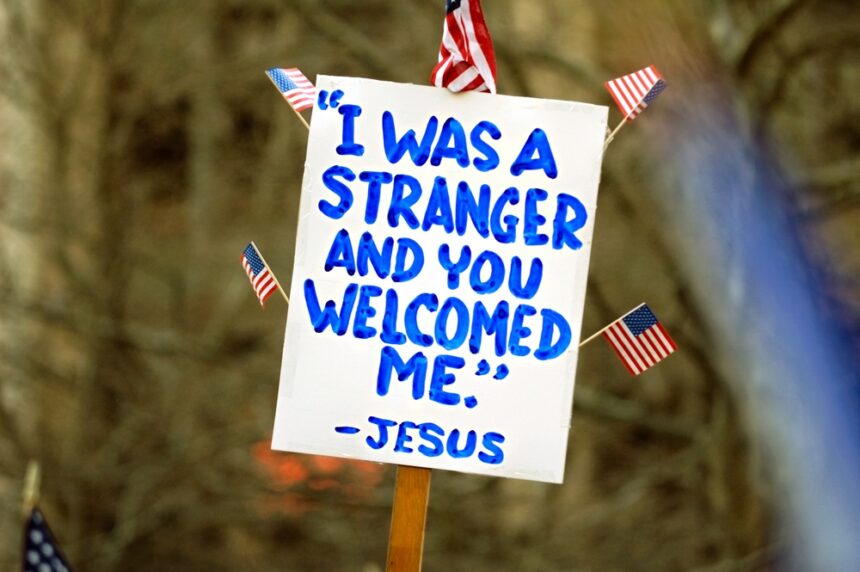(Image source: Jorge Salcedo/Shutterstock)
“I used to say, ‘I’m a Republican – no ifs, ands, or buts,’” said Summer (pseudonyms used throughout this article), an evangelical Christian who runs a food pantry for resettled refugees in the Midwest. “Now, I don’t even know what I am,” she laughed. Summer started volunteering with a faith-based refugee resettlement agency over a decade ago. She has since helped to set up apartments for new arrivals, provided transportation to grocery stores and doctors’ appointments, and taught English to resettled refugees. Now, she runs the resettlement agency’s food pantry program, which provides culturally appropriate groceries for upwards of 60 families per month.
Recalling the array of anti-immigrant policies enacted during the first Trump presidential administration, she reflected, “I didn’t agree with how Trump was treating the immigrants, but then, I had friends that were like ‘well, he’s doing a good thing’ that go to the same church that I do.”
Summer says her experience with resettled refugees has changed the way that she thinks about immigration. “I grew up in a white town, a small town,” she explained. “A lot of white Christians stay in their own bubble, and they lose the empathy for people different than them because they isolate.” But after building relationships with resettled families from Sudan, Myanmar, and Cuba, Summer could not ignore the effects of Trump’s anti-immigrant rhetoric and policies on the lives of her immigrant friends—policies that sowed fear, stoked xenophobia, and further marginalized many, such as Muslim immigrants.
When Donald Trump ran again for president in 2020, Summer reconsidered her vote, and found that her political opinions differed significantly from close family and friends: “They’re like, ‘well, you’ve got to vote Republican’—and I’m like, ‘No, you don’t. You’ve got to think about everything, the [candidate], and what exactly they’re standing for.’”
While some American evangelical groups have welcomed refugees and other immigrants for decades, recent years have seen a hardening of political opinion on immigration in the U.S., with white evangelicals consistently polling as the demographic with the most restrictive and negative views. In 2016, nearly 81 percent of white evangelicals voted for Donald Trump, a candidate synonymous with xenophobic rhetoric and restrictive immigration policies. Exit polling suggests that former President Trump received similar levels of electoral support from this demographic again in 2024. Yet across the country, evangelical Christians like Summer work to aid asylum seekers, welcome immigrants into their communities, and resettle refugees. These welcoming actions, often undertaken at significant cost to volunteers’ own time or financial resources, quietly complicate homogenous xenophobic characterizations of American evangelicalism and divisive national politics.
Since 2016, I have interviewed over 50 evangelical Christians who volunteer or are employed with refugee resettlement activities. What I have learned is that although the Biblical directive to “welcome the stranger” is clear, American evangelicals differ on what it looks like to obey this command today—and exactly who should be responsible for providing this “welcome.” They also wrestle with how their faith should affect their politics, often coming to divergent conclusions about how to weigh their experiences with immigrants as they formulate their political opinions about immigration policy.
***
The United States has historically hosted the largest refugee resettlement program in the world, working with the United Nations’ refugee agency to resettle some of the world’s most vulnerable refugees. Although refugee resettlement has enjoyed relative levels of support among most Americans since the 1980s, the U.S. resettlement program became increasingly politicized in the lead-up to the 2016 presidential election.
Following the onset of the Syrian Civil War in 2011, the number of people forcibly displaced by conflict around the world soared to record-breaking heights. By 2014, international news media was heralding a global “refugee crisis,” as thousands of refugees from North Africa and the Eastern Mediterranean sought passage to Europe in search of safety. In response, President Obama announced in September 2015 that the United States would expand that year’s resettlement admissions ceiling to include 10,000 additional Syrian refugees.
In November 2015, a group of terrorists, some of whom entered the European Union falsely claiming to be Syrian refugees, perpetrated a devastating attack in Paris. Within days of the attack, 31 U.S. governors declared that their states would not accept Syrian refugees. Then-candidate Donald Trump seized on the chance to advance his anti-immigrant campaign rhetoric, characterizing Syrian refugees as a “great Trojan horse” and casting aspersions on the security of the refugee vetting process. A mere seven days after his 2016 presidential inauguration, President Trump issued a series of executive orders aimed at halting the refugee resettlement program and curtailing immigration from seven Muslim-majority countries.
The so-called “Muslim Ban” sparked immediate controversy. Within hours, protests against the ban erupted in airports and major U.S. cities. Legal challenges to its implementation began immediately as advocacy groups filed suits against the administration to halt the order. Two days after the ban’s announcement, leaders of prominent evangelical groups such as the National Association of Evangelicals, the Wesleyan Church, and World Vision, among others, wrote an open letter to President Trump and Vice President Pence asking that the administration “reconsider” the policy, “allowing for resettlement of refugees to resume immediately.” Despite such pushback, Pew Research found that 76 percent of white evangelical Protestants approved of the ban, more than any other socio-religious group. Meanwhile, 59 percent of Americans opposed the ban.
Yet the Muslim Ban was not welcomed as a political victory by all evangelicals. Instead, many evangelicals responded by seeking to learn more about refugees to the United States, what happens once they arrive, and how to welcome them. World Relief, a national evangelical resettlement agency, reported over 6,000 new volunteer applications in 2017 alone.
Jenny Yang, the organization’s former Vice President of Advocacy and Policy, characterized this “overwhelming response” as a result of “people desiring to act locally in response to the global refugee crisis.”
Other evangelical resettlement efforts saw a similar surge in interest. Naomi, a volunteer coordinator at a local evangelical organization in Kentucky, recounted a shift in attitudes towards refugees following the January 2017 Muslim Ban. The organization experienced a significant increase in donations and volunteer interest from evangelical churches and individuals, reflecting a growing awareness and empathy towards refugees among the evangelical community.
By the end of 2017, 55 congregations and over 750 new volunteers across Kentucky had joined in resettlement support work. The organization’s director, Nathan, attributed this increase in volunteerism to the polarizing rhetoric and anti-immigrant policies of the Trump administration, such as the Muslim Ban, which spurred more evangelicals to get involved in helping immigrants in their local communities.
As evangelicals across the country engaged in resettlement work, many found their perspectives on immigration shifting. Some, like Summer, experienced a transformation in their political opinions after working with immigrants and refugees, while others, like Evelyn, were frustrated by the lack of empathy for immigrants within their evangelical community.
Despite the clear connection between their Christian faith and efforts to assist refugees, few evangelicals saw Biblical commands about welcoming strangers as influencing their political behavior. While many recognized a moral responsibility to welcome immigrants, they remained unsure about what compassionate immigration policy should look like in practice. Rachel, a volunteer with an evangelical resettlement organization in Illinois, was inspired to join efforts to assist refugees in her area following the influx of displaced individuals from Ukraine and Afghanistan due to escalating conflicts in those countries between 2021 and 2022.
Despite her eagerness to aid refugees impacted by these violent conflicts, Rachel expressed reservations about security in the immigrant admissions process. She emphasized the need for some level of control to prevent potential negative consequences for America if a large number of people were allowed to enter the country without proper vetting. Rachel particularly highlighted her concerns about the resettlement process for Afghans arriving on humanitarian visas, noting that assumptions about their character based on their assistance to America may not necessarily be accurate.
However, Rachel’s political views do not hinder her commitment to welcoming refugees as a volunteer. She believes that regardless of how refugees arrived in the country, they are present in her community and deserve hospitality. Rachel emphasized that her actions are motivated by a desire to show kindness in the name of Jesus, separate from her political beliefs.
While some of Rachel’s evangelical family and friends have made political comments regarding her volunteer work, she remains focused on the humanity of the refugees she serves. Similarly, other evangelicals, like Kate, approach resettlement work with a focus on meeting physical and spiritual needs, rather than engaging in overt evangelism.
Despite their personal involvement in resettlement efforts, many evangelicals do not translate their convictions about immigration into political advocacy. Instead, they view the responsibility of welcoming immigrants as a task for the Church and individual believers, rather than government institutions or policies.
Reuben, an evangelical pastor involved in post-resettlement support in the southeastern United States, believes that the Church should play a central role in welcoming immigrants and refugees, filling gaps left by federal programs. He emphasizes the Biblical directive for Christians to show hospitality and welcomes refugees into their community, regardless of political actions or policies.
Overall, while white evangelicals have shown strong support for certain political figures and policies, those involved in resettlement work tend to focus on individualized, localized efforts rather than advocating for broader political change. Their commitment to welcoming refugees is rooted in personal transformation and a desire to show compassion to those in need, guided by their faith. For many white evangelicals, even deeply personal encounters with immigrants and refugees do not seem to be enough to break their loyalty to anti-immigrant Republican Party politics.
These divisions highlight the challenge of rallying evangelicals around pro-immigrant causes, as appeals to shared beliefs or biblical teachings do not always lead to unified action.
Emily Frazier, an assistant professor of human geography at Missouri State University, focuses her research on refugee resettlement and faith-based humanitarian efforts in the US. Her work has been featured in various academic and public publications.
Source link





